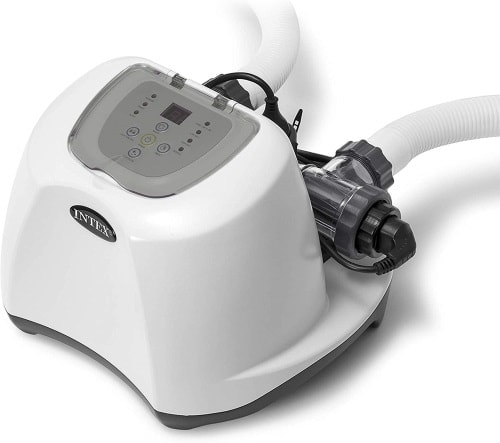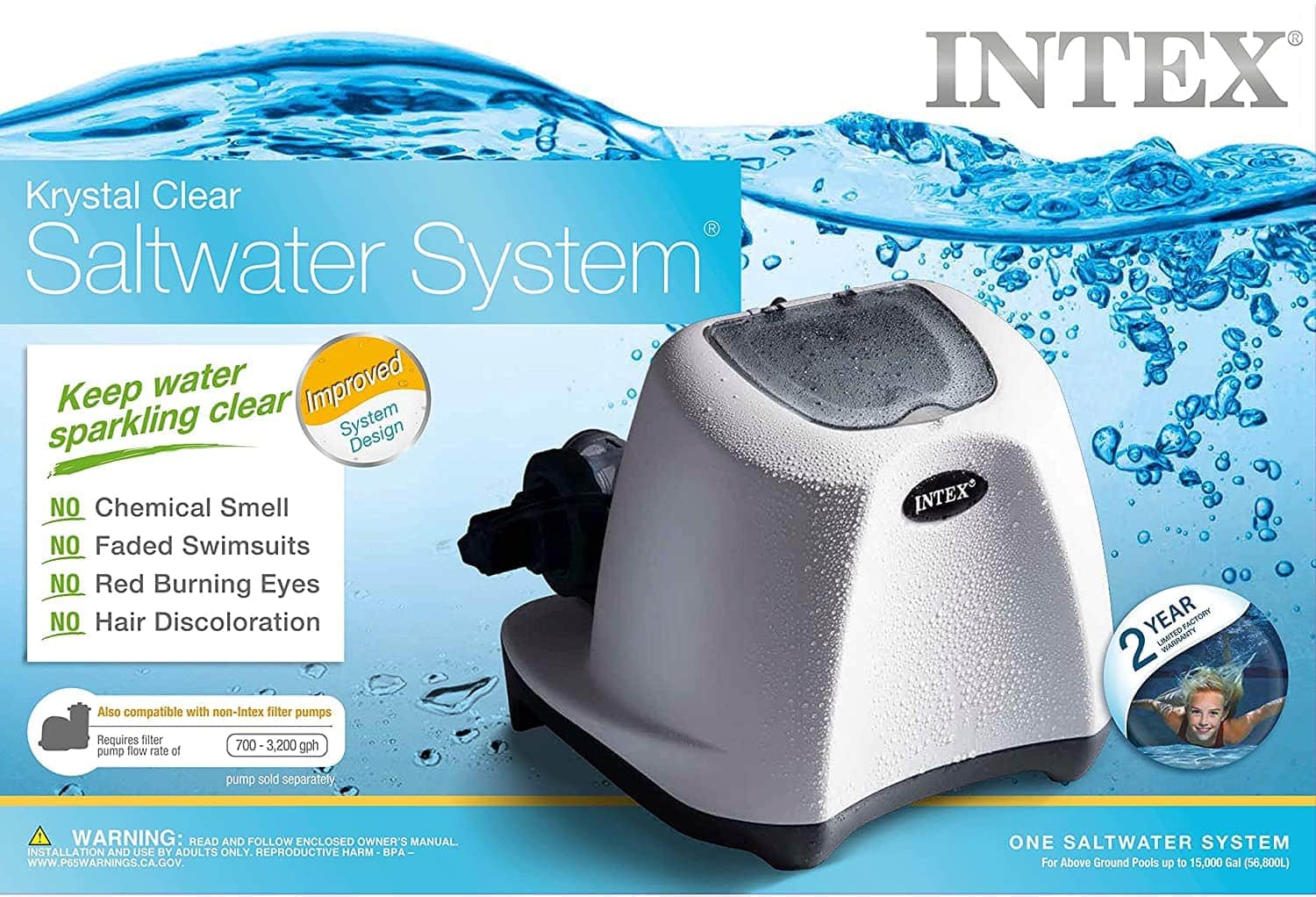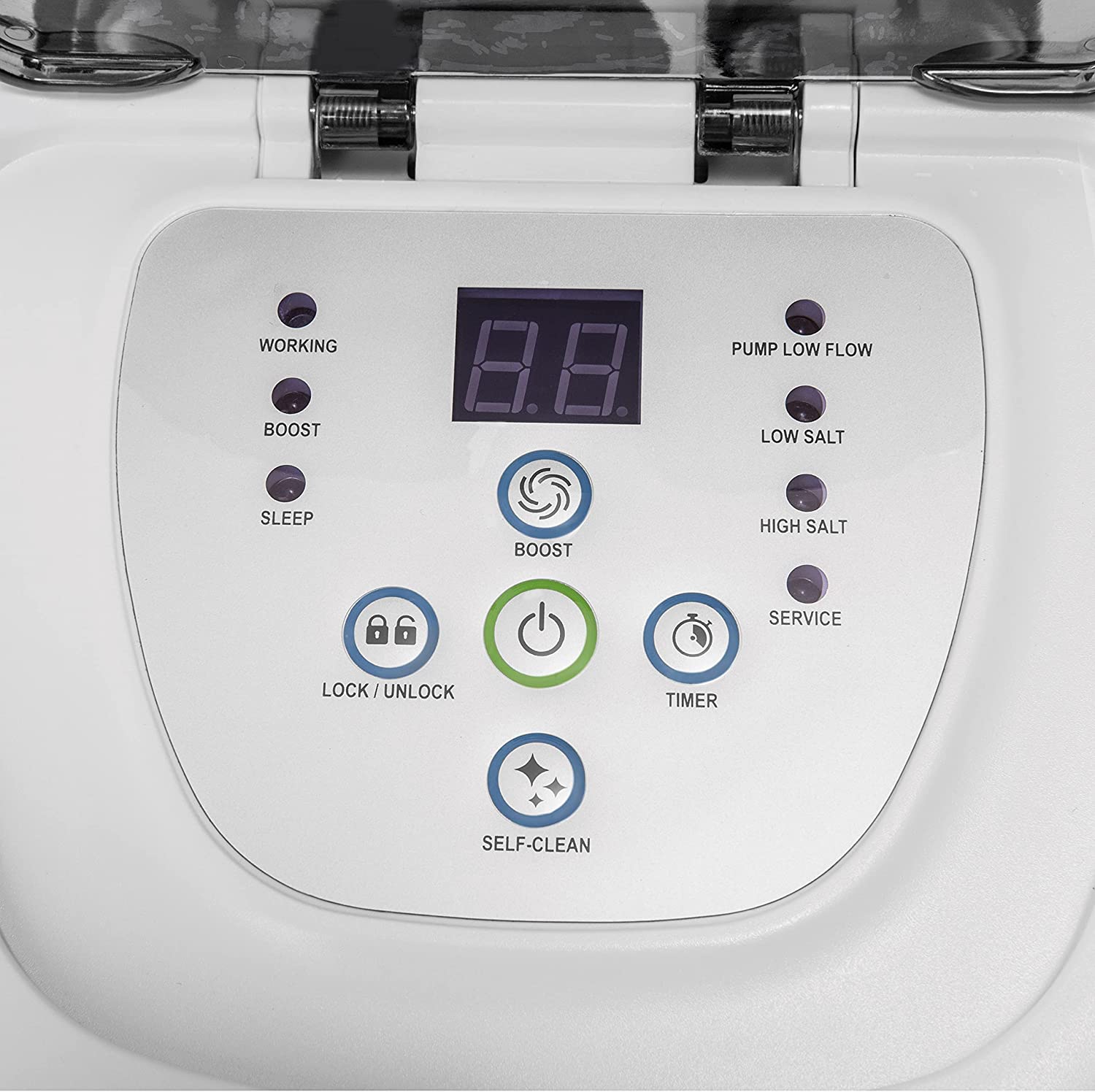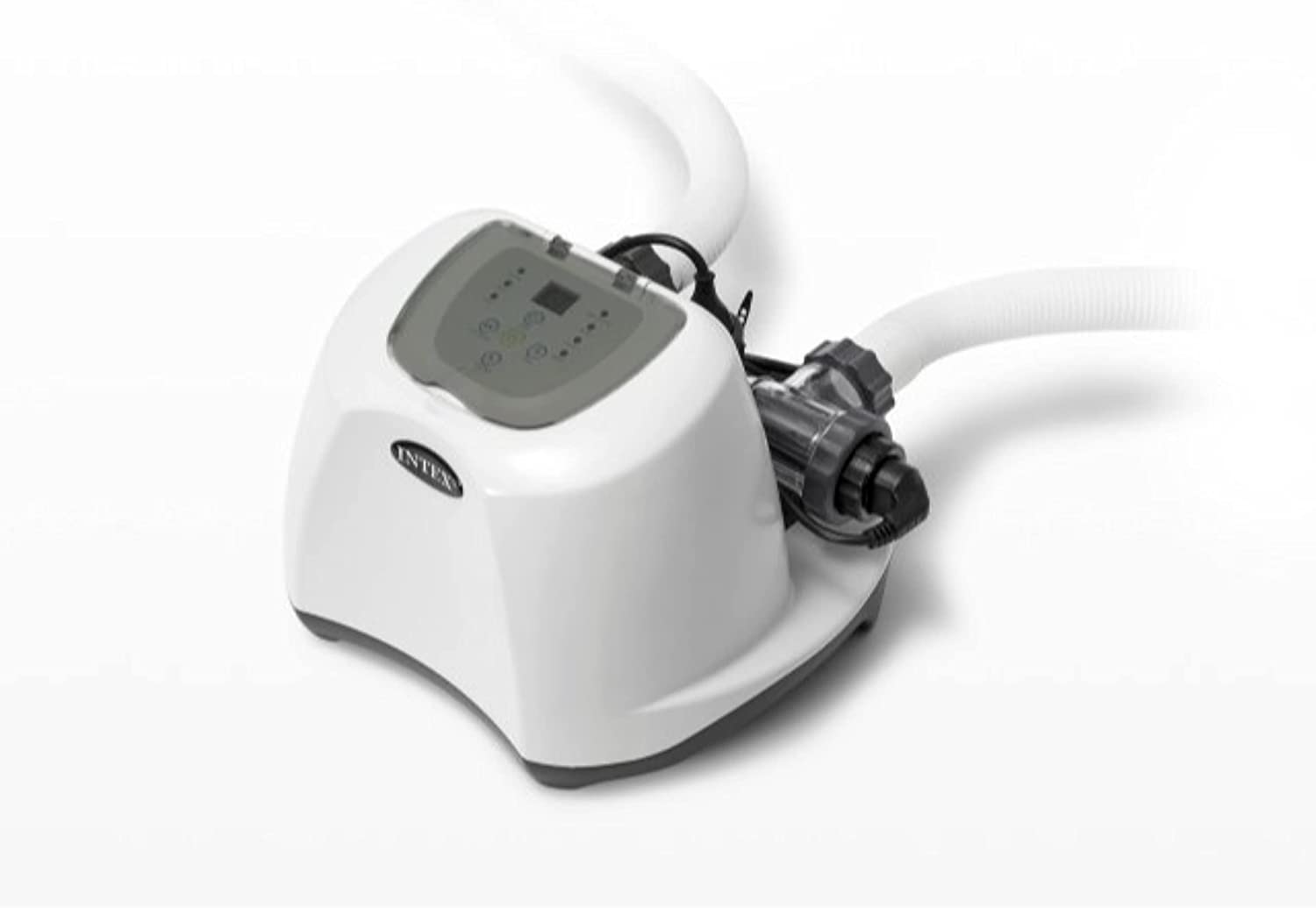Intex Krystal Clear Saltwater Filtration System Review 2025 – Pros, Cons, & Verdict
-
Pete Ortiz
- Last updated:

We give the Intex Krystal Clear Saltwater Filtration System a rating of 4.4 out of 5 stars.
Swimming is a very popular summer activity, but some people have trouble with the chemicals that are used to keep pools clean. Many have discovered that installing a saltwater system to their existing pump takes away the need for a synthetic chemical. Since these generators are an addition to what they will be using, they cost more upfront. Some people are concerned that the benefits won’t outweigh the higher initial cost of these systems. We decided to purchase one to use on our pool and compare the two systems. Is one easier to maintain? Does the amount that you save in buying chlorine make up for the extra cost in the beginning?
Editor Rating: 4.4/5
We give the Intex Krystal Clear Saltwater System 4.4 out of five stars. Set-up is quick and painless. It’s all-natural and simple to use, and there isn’t much to do to maintain it. The only downfall is that it can be challenging to work with the Intex customer service department if you have any warranty problems.
Set-up: 4.8/5
The Intex Krystal Clear Saltwater System is simple to connect to the pump that you already have filtering your water. It took us about 10 to 15 minutes to set up. The only tool we used was a flat head screwdriver to tighten the hose clamp.
Once you have added the salt to your pool, we recommend that you let your pump run for about 24 hours before turning on the saltwater generator (SWG), to give the salt time to dissolve fully.
Salt and Durability: 4.4/5
We love that these pools use natural salt, so they are environmentally safe and don’t irritate the skin. The salt concentration in the pool is only about 1/10th that of seawater. That is low enough that users aren’t even aware that it’s there.
There should be no problem getting four to five years of use out of your Krystal Clear system if you maintain it per the instructions in your owner’s manual.
Maintenance: 4.5/5
There isn’t much to manage in saltwater pool systems. We love that the salt will turn into chlorine when it’s at 2800 PPM (parts per million) or more. We don’t have the extra cost of purchasing chlorine, and we don’t have to remember to add it every day or two.
Salt doesn’t evaporate as water does. There was only one time that we had to add some salt to our system. We had pretty heavy rainfall for a couple of days straight that raised the water level in our pool quite a bit. We either needed to drain it back down to where it was or add more salt to accommodate the extra water.
Ease of Use: 4.7/5
The Intex Krystal Clear Saltwater System has a control panel that’s simple to use, and an easy-to-read LCD screen that clearly states if there is a problem. It also has an automatic timer that we love. It turns the unit on at the same time every day and shuts it off after the desired amount of time. It’s great. We do check it periodically to make sure it’s working like it’s supposed to, but we don’t have to think about it much.
We also love the boost button. It helps to make chlorine faster and will shock your pool to keep it crystal-clear. It makes the pool self-cleaning.
Cost: 4.2/5
Intex has six Krystal Clear Saltwater Systems available that range in price from $150 to $300. Since the units last four to five years, that breaks down to a cost of $60 – $75 a year. You can easily spend that much on chemicals for freshwater pools.
Warranty: 3.8/5
Intex has a limited two-year warranty from the date of purchase on the Krystal Clear Saltwater System. The warranty isn’t transferable, so keep a copy of your original receipt to show proof of purchase if you ever have a problem. The warranty will be void if you don’t have the receipt.
When there is an issue with your pump, always call Intex before shipping anything back. You will need to explain the problem to customer service, and they will determine if your claim is valid or not. If they think it’s legit, they will inform you to send it to them, where they will physically look it over to verify validity. If it’s a covered item, it will be repaired if possible and sent back to you. If it’s not fixable, Intex will ship you a replacement at no cost to you.
We haven’t needed to contact Intex for any warranty issues, but we understand from other users that dealing with the customer service department can be challenging.
Take a Quick Look
- Easy to install
- Uses natural salt
- No chemicals
- Salt doesn’t evaporate
- Easy-to-use control panel
- Self-cleaning
- Automatic timer
- High salt alert over 3000 PPM
- Rain lowers the salt level
- Salt level is based on the current of the water
- Limited power supply puts a massive demand on the pump
Advantages over freshwater pools
- Saltwater pool systems have several advantages over freshwater ones, but the one that jumps out the most is how they handle chlorine. Saltwater systems produce chlorine, but only when the SWG determines that it’s needed.
- You don’t have to worry about storing harmful chemicals or adding some to your pool every day or two.
- Saltwater systems have lower chlorine levels that make pool water feel softer. The lower chemical levels aren’t as harsh on the skin or the eyes.
FAQs
1. How do saltwater generators work?
A saltwater generator is a machine that breaks dissolved salt into two sanitizing agents used in the chlorine for freshwater pools. The two agents circulate through the water to sanitize it. When the generator is turned off, the two sanitizers turn back into salt to be used again in the next cycle.
2. What kind of salt do they use?
The Intex Krystal Clear Saltwater System uses only natural salt. The bag will have a label stating that it is “pool salt.” This label is how you will know the salt is safe for use in your pool.
3. How much salt will I need?
The amount of water in your pool determines how much salt you will need. Your owner’s manual will tell you the correct amount of salt for the size of your pool. Most of them fall in the range of 3000 PPM to 4000 PPM.
4. How long do these systems last?
Most residential saltwater generators are suitable for up to 10,000 hours of operation. If used according to the directions in the owner’s manual, your system should last four to five years.
What Do Users Think?
- Set-up
Everyone loves how simple this system is to connect to the pumps they’re already using. We haven’t heard any complaints about the set-up.
- Ease of Use
People love not having to deal with chemicals. These systems run by themselves with a timer, so they clean themselves. You can’t ask for more than that.
The chief complaint that we see is people getting an error indicating a high salt level. The owner’s manual states that a reasonable rate is 3000 to 4000 PPM, depending on the size of the pool. These systems seem to work great until you go over the 3000 PPM mark. That is when the errors generally start up. We have found that if we keep ours between 2800 and 3000 PPM, our system works fine. We have a medium-sized generator for our medium-sized pool. Larger generators will handle the higher salt concentrations better.
- Maintenance
People like the fact that the saltwater system doesn’t require any chemical maintenance and cleans itself. Your owner’s manual will tell you how long you need to run the SWG every day. The automatic timer will turn it on at the same time every day and shut it off when the cycle has completed. Take note of the time difference in pools with and without a stabilizer. The stabilizer does affect the amount of time that the SWG needs to run daily.
Again, the only complaint is the high salt error. If your water level changes due to evaporation or rain, the sensor can go off and shut the motor down. If you have problems with this code, you will need to check your system daily until the levels get stabilized.
- Cost
Most people consider the price to be affordable. It does cost more right out of the gate because it adds to the system that you purchase. You quickly regain the extra cost when you don’t have to buy the chemicals that you would’ve had to if you didn’t have the system.
In Conclusion
People have used freshwater pools that require them to add chlorine to sanitize their water for years. The chemicals can be harsh to the eyes and skin, though. For this reason, many people have begun using saltwater systems instead of the actual chemicals. Saltwater generators determine how much chlorine your pool needs and break the salt down to make the perfect amount. People love that these systems are safer for their families to use, and better for the environment.
Of course, some don’t like saltwater systems, but everyone has their preferences. For the most part, you can’t go wrong with a saltwater pool. They are incredibly easy to maintain, keep your water crystal-clear, and offer your family and friends hours of enjoyment without any harsh reactions to added chemicals.
Contents






